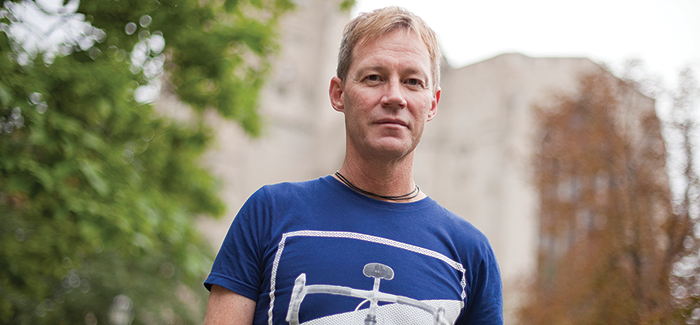
Comparative human development’s new chair sees the field expanding in new directions.
In this isolated village of about 200 people, Don Kulick lives in a palm tree bark house built for him by Gapun villagers and eats food they prepare while he completes a dictionary and grammar of Tayap, their undocumented language that has only about 45 speakers. To thank the villagers for their hospitality, Kulick brings them gifts such as butcher knives, which have multiple functions in the rain forest—including being the favorite playthings of curious toddlers. “Kids love them,” Kulick says, “and parents give them anything they want. Sometimes the babies cut themselves, but they all handle butcher knives expertly by the time they are three.”
In addition to Papuan languages, Kulick, who earned his PhD in anthropology from Stockholm University in 1990 and joined UChicago from NYU in 2008, has also studied gender and sexuality since early in his career. In the 1990s he conducted anthropological field research in Brazil, living with transgendered prostitutes and writing a monograph about them, which was published by the University of Chicago Press in 1998. Both travestis and Gapun villagers, whose traditional practices have “been all but extinguished by colonialism and missionaries,” he says, represent vulnerable populations, which Kulick has made a point to focus on in his research.
In his latest book, Kulick examines another vulnerable population. Loneliness and Its Opposite: Sex, Disability, and the Ethics of Engagement, written with Swedish historian Jens Rydström, will be published by Duke University Press in February 2015. In the book, the authors investigate how Scandinavian caregivers in group homes respond to the sexual lives of significantly mentally and physically disabled adults. Sweden and Denmark, both considered progressive, “diverge when it comes to sexuality and disability,” says Kulick. In Sweden, professionals actively prevent disabled adults from having sexual experiences. Social workers and staff in Danish group homes, in contrast, “help to facilitate the sexual lives of people with disabilities,” Kulick says, “not by having sex with them but by helping them understand and explore their sexuality in other ways.” Living in the homes, he observed that many Danish helpers have an attitude of, “Let’s work together to figure out what you want.”
Growing up with a younger sister with Down syndrome sensitized Kulick to the perspectives of others, he believes. It also made him more aware of bigotry and discrimination. His 2005 coedited book, Fat: The Anthropology of an Obsession (Jeremy P. Tarcher/Penguin), was motivated partly by the dismay he felt observing the discrimination he saw routinely directed at overweight people.
Back in Chicago from Scandinavia and Papua New Guinea for autumn quarter, Kulick, who became chair of Comparative Human Development in July, is teaching a course on the philosophy and ontology of vulnerability, where he plans to examine ;“how vulnerability can be thought about not just as a privation but instead as something productive, something that invites engagement and responsibility.”
Kulick’s interest in vulnerable populations takes his studies beyond humans: he sees animal studies as part of the department’s future (and has published on the topic of “fat pets”). By paying attention to nonhuman animals, says Kulick, researchers can reevaluate questions like “What is a human?” “What does it mean to be human?”
Comparative Human Development prioritizes interdisciplinary work: academics from many disciplines merge to study fields including anthropology, behavioral biology, and cultural and developmental psychology, highlighting race, gender, class, and sexuality. Yet by and large, Kulick believes, scholars in the humanities and social sciences “still haven’t covered species as a theoretical and empirical area of investigation.” It’s important to ask, “How do we engage in a respectful way with beings who are never going to talk to us?”
Kulick calls associate professor Jill Mateo’s research “particularly exciting.” Mateo, who focuses on kin recognition and survival behavior of small animals, studies animals “from a basic perspective,” she says, “which may or may not benefit humans.” In her research on ground squirrels, she’s found that those with more kin connections tend to live longer. She uses the squirrels as a model to understand how that happens in the squirrels and in other species, including humans.
Mateo and Kulick plan to coteach a graduate seminar exploring the species divide between humans and animals. “A course like that would speak to the interdisciplinary nature of Comparative Human Development,” she says. “We don’t just have folks from multiple areas, but we work together and think about topics together.”
The department will remain forward focused, Kulick says, by asking questions about what counts as human. “And if something doesn’t count as human, how do we engage with it in a way that recognizes its inherent dignity?” As Kulick puts it, “Those are issues that Comparative Human Development could be at the forefront of.”
